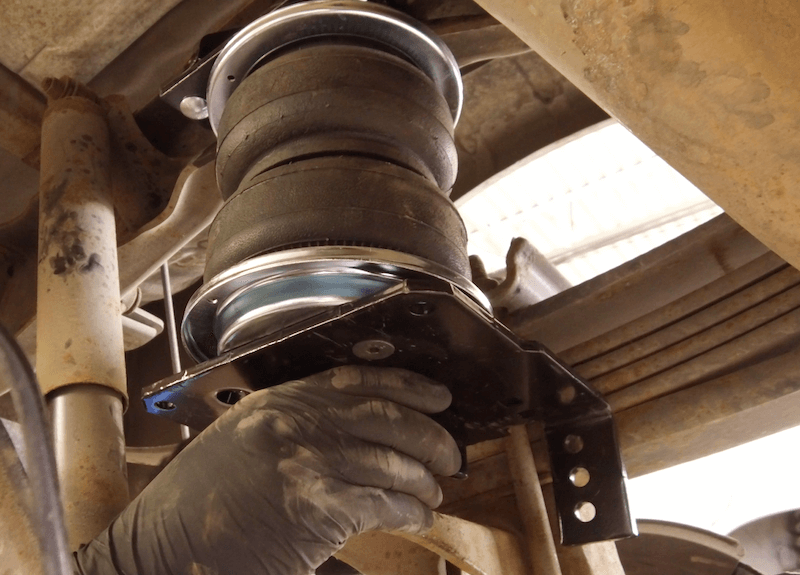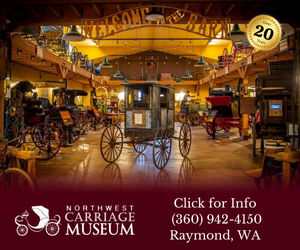Prepping the Truck
By Robert Eversole

Welcome to the start of a new series for horse owners considering a new trailer or upgrading one. To use all your hard-learned savvy on the trail requires getting yourself and your horse to the trail. To make that happen, we adventure seekers depend on trucks, trailers, and all the equipment that makes them work together.
My 12’ EBY bumper pull is fantastic, but I want to be able to haul a few more animals and their assorted gear, as well as enjoy a more comfortable stay at the trailhead, so a bigger rig is in order. For the next few months I’ll be sharing my trials and tribulations with you as I move from a small bumper pull to a larger gooseneck that I’ll be converting into a do-it-yourself living quarters.
For this segment, we’ll be discussing the changes I made to my truck to more safely haul a bigger trailer.
Sally, my 2008 Ford one-ton diesel short bed, is a big girl. Not as big as I’d like, the short bed kills the truck’s functionality but was a necessary evil at the time I bought her. I had thought that a one-ton truck wouldn’t need any modifications other than a gooseneck hitch. I was wrong.
Air it Up
After years of pulling a bumper mounted trailer I’d noticed that with heavy loads not only would the steering feel “light”, the headlights would tend to illuminate the trees and not the road ahead. Neither of these were particularly comforting sensations, especially when hauling several horses as well as feed and supplies for an extended camping trip. I thought the solution was a bigger truck to haul the bigger load. Again, I was wrong.
Squat was my problem, and it was much less expensive to fix a saggy rear end than to purchase a new vehicle. Sally, you’re going to be around for a little longer!
After a lot of research, I went with a load support system from Air Lift and I wish that I had invested in the system years ago. My system included the air bags and an onboard air compressor with wireless remote control, so I can inflate and deflate the air springs with a touch of a button. This gives me the ability to adjust the height and ride of the suspension based on what I’m hauling or carrying. Whether I’m hauling a fully loaded trailer or making a light run to the recycling center I can set the ride to what’s both comfortable for me and safe for the load.
Not being much of a mechanic and reluctant to break my truck, I thought it best to have the system installed professionally by my local tire and repair shop, Tire-Rama. I was incorrect. While it’s great to watch other people work and avoid crawling under the truck, the install of the system was in fact straight forward. I think that even I could have done the job had I been so inclined. Even with my endless questions, Steve had the job done quickly and neatly within a couple of hours.
After upgrading to an Air Lift system I’m a convert. The adjustable air springs allow me to customize my suspension to my load making for a smoother, safer ride. There’s a reason why semi trucks use air springs. I’m glad I joined the club, and I’ll be riding on air far into the future!
Hitch it Up
When you’re towing major equipment such as a horse trailer you need the right setup to get the job done. With a gooseneck style trailer that means my old rear receiver hitch wasn’t going to work. I needed to mount a new hitch in the bed of my truck. But which hitch?
I use Sally for much more than moving horses. She hauls hay, water, and any of the myriad of items used on any farm. Sally’s a worker so any hitch that goes in the bed needs to be removable when we’re not towing the trailer. I’ve been very grateful to have the option to turn the ball over, or even take it out completely, when I need to use the whole of the truck bed.
I’ve seen removable balls that aren’t removable due to sticking, freezing, or rust, so being confident in my ability to remove said ball was an important consideration when choosing a gooseneck hitch. For me that meant going with PopUp Towing’s Flip-Over Ball hitch. The round shank of the ball rotates easily and, should it even try to seize up, can be manipulated with a wench. Some of the other manufacturers I considered have square shanks that seem to freeze up easier.
Again, not being much of a mechanic I opted to have the guys at PopUp do the install. In this case, I’m glad I did. It wasn’t necessarily a hard job (heck, you don’t even have to move the exhaust), but 10 years of my ownership had left a fair number of rusted bolts to break free. However, even with that slow down, the guys at PopUp had the hitch installed and me on my merry way in just a few hours.
There you go — the two most important changes I made to the truck to prepare it for hauling a larger trailer. Next month we’ll continue the adventure by considering the important features we should be looking for in a horse trailer.
For more information on this topic as well the largest and most accurate guide to horse trails and camps in the world visit www.TrailMeister.com.
Get Ready for a New Trailer – Part 2

Robert Eversole, ”the trail meister,” owns www.TrailMeister.com, the largest database of horse riding and camping areas in the U.S. with free trail and trailhead information, trail maps, and much more to help horse enthusiasts experience the joys of trail riding. Robert is a registered riding instructor with PATH International, a mounted search and rescue team member, and a U.S. Marine who has served on the board of the Backcountry Horsemen of Washington (BCHW). He is enjoying his new career helping fellow trail riders stay found and safe on the trail. When not on the trail, The Trail Meister resides near Spokane, WA and teaches land navigation to a wide variety of outdoor groups across the nation. For North America’s largest horse trail and camping directory, trail tips, and more, visit www.TrailMeister.com.





